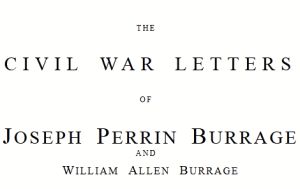 Many extended Northern families send a number of male members to serve in the Union Army. Such is the case with the Barrage family of Massachusetts, a family of Baptists.
Many extended Northern families send a number of male members to serve in the Union Army. Such is the case with the Barrage family of Massachusetts, a family of Baptists.
Henry S. Burrage, born in 1837 in Fitchburg, graduated from Brown University (Providence, R.I.) in 1861, then enrolled in Newton Theological Institution (Centre, Mass.) on August 1, 1862. His theological education, however, was immediately erupted. Joining Company A, 36th Regiment, Massachusetts Volunteers, Henry obtains the rank of sergeant major by the end of the month. Today, his company is en route to Washington, where they will become a part of the 9th Army Corps, even as Confederate General Robert E. Lee is invading Northern territory. He serves valiantly throughout the war, fighting in many major battles and suffering imprisonment in early 1865.
Following the war, Henry finishes his theological studies at Newton and subsequently studies in Germany. Pastoring the Waterville Baptist Church in Maine from 1869-1873, Burrage becomes better known as a writer and journalist. Among his works are Brown University and the Civil War (1867) and A History of the Baptists in New England (1894).
Relative Joseph P. Burrage, born in 1842 in Boston, pursued a ministerial career in his early years, entering college in 1858.
He secured and always maintained a good rank as a scholar, and soon made a public profession of religion. After the attack on Fort Sumter and the Baltimore riot, he felt a great desire to enlist, but decided to complete his college course. He therefore remained in the university and graduated honorably in the class of 1862. He pronounced an oration at the Commencement exercises, and three days later enlisted as a private in the 33d Mass. Vols. Four days later, just one week from his graduation, he entered upon his duties in camp at Lynnfield.
Joseph has faithfully served the United States since, and now his regiment is part of the Army of the Potomac, scrambling to defend the nation’s capital from possible attack by the Confederate Gen. Robert E. Lee’s Army of Northern Virginia. Today Joseph writes:
We see rather more of the realities of war here than at home. One of our men I was talking with this morning said ‘if he had known as much as he did now he would not have enlisted, and I think that is the state of a good many that enlisted for the fun of the thing or to get the bounty. I should enlist again if I were set free, though I must confess it looks pretty dark just now,—our troops back just where they were a year ago and so many lives lost for nothing.
Unlike Henry, Joseph does not survive the war. Engaged in a skirmish in a prelude to the Battle of Lookout Mountain, Joseph is shot in the heart and dies far from home in the dark, early morning hours of October 24, 1863, near Chattanooga, Tennessee.
Sources: “Letters of Joseph Perrin Burrage and William Allen Burrage,” Virginia Tech, pp. 137-148 (link); Henry S. Burrage, A History of the Baptists in New England, Philadelphia: American Baptist Publication Society, 1894 (link)


